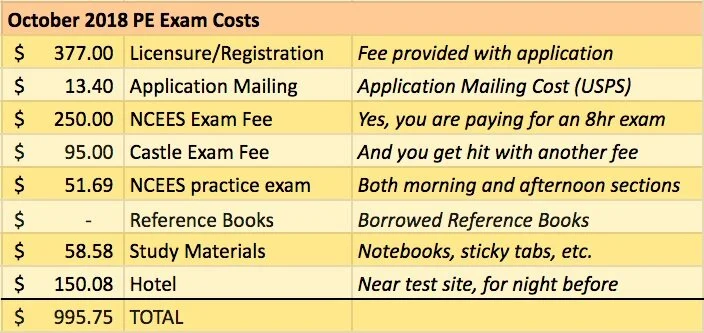Exam Sign Up
What is the PE Exam? The PE exam stands for the Principles and Practice of Engineering exam. It’s an 8-hour exam, split up in a 4-hour morning session and a 4-hour afternoon session. If you pass and meet the other qualifications, you can be registered as a professional engineer with your own license number and seal.
Note this post does NOT cover the 16-hour structural exam (SE).
Qualifications: Required qualifications for taking the exam vary state to state. Check your state’s age, education, examination, and education requirements. Generally, you will need to have passed the F.E. exam and completed four years of experience following your ABET accredited Bachelors in Engineering. You’ll need references (some of which may need to be PE’s themselves) to vouch for your abilities. Also, technically a requirement is that you can’t be a scum bag. But maybe they’ll phrase in a more bookish-way, like “you shall be of good moral character.”
Do you take your PE? Decide for yourself if you would like to make the investment to take the exam. Being a PE can result in tangible benefits such as a raise, promotion opportunities, and the ability to start your own practice. Some intangible benefits are marketability for job mobility and some street cred. The cost is reference books & study materials, application & registration cost, and a whole lot of time studying. Some companies will pay for the test, study materials, and preparation classes - take advantage if you are lucky enough to work for one of these companies. For those of you paying out of pocket, my own cost breakdown is below for a reference point.
Note that I borrowed reference materials (CERM and codes/manuals) for free and got a hotel about 10 minutes away from the testing location.
Pick your “depth” topic. For Civil Engineering, there is Construction, Geotechnical, Structural, Transportation, and Water Resources & Environmental. The best way to choose your topic is to pick the one that you’re most comfortable with. Look at the exam specifications provided on the NCEES website. If you’re in between two topics, published passing rates can help you decide what test might be “easier.”
When to take your exam. One plan of attack is to study on your own timeline and send in your application when you’re ready to take the exam. This plan is good for people with busy/unpredictable schedules, those with a little extra studying to do, and the perfectionist who may have anxiety about taking the exam. On the flip side, you can send in your application and then you’ll have a limited time frame to study. This plan is good for people who procrastinate, those that thrive on pressure, and the super geniuses that don’t have much to study.
Where to take your exam. You will generally want to get licensed in the state that you’re going to practice in. But there are exceptions. It may be easier to get registered where you passed your FE exam. You may get lots of projects from a neighboring state. You may have the option of several states and want to choose one where the application is easier. Or maybe you want to avoid a certain state’s extensive processing time. Once you get a PE in one state, you can get registered in other states by filling out the appropriate application forms. Note that there may be certain states that also require you take different exams (like the SE) and you’ll have to research your state’s requirements.
Filling out your application. The application should be straightforward. It’s mostly just answering questions about yourself and your work experience. Different states will have different requirements and different application forms. I filled out the NY application and the only part I found vague was the description of specific engineering work. I used resume-style language with three to five sentences for each project listing key tasks and applicable code.
If you do end up deciding to take the test… stay tuned for future posts about my study plan and exam tips!

